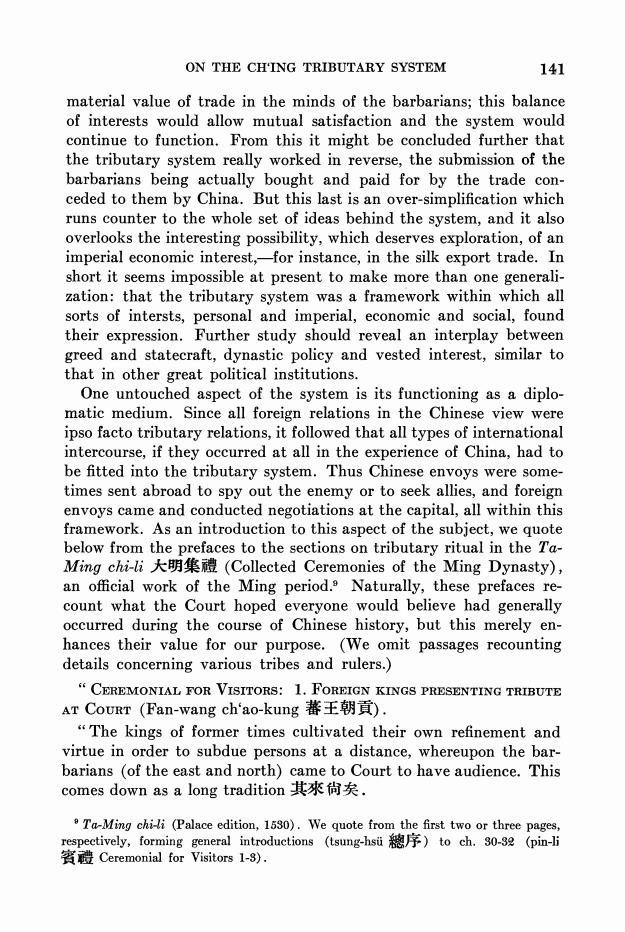正在加载图片...

ON THE CHING TRIBUTARY SYSTEM 141 material value of trade in the minds of the barbarians;this balance of interests would allow mutual satisfaction and the system would continue to function.From this it might be concluded further that the tributary system really worked in reverse,the submission of the barbarians being actually bought and paid for by the trade con- ceded to them by China.But this last is an over-simplification which runs counter to the whole set of ideas behind the system,and it also overlooks the interesting possibility,which deserves exploration,of an imperial economic interest,-for instance,in the silk export trade.In short it seems impossible at present to make more than one generali- zation:that the tributary system was a framework within which all sorts of intersts,personal and imperial,economic and social,found their expression.Further study should reveal an interplay between greed and statecraft,dynastic policy and vested interest,similar to that in other great political institutions. One untouched aspect of the system is its functioning as a diplo- matic medium.Since all foreign relations in the Chinese view were ipso facto tributary relations,it followed that all types of international intercourse,if they occurred at all in the experience of China,had to be fitted into the tributary system.Thus Chinese envoys were some- times sent abroad to spy out the enemy or to seek allies,and foreign envoys came and conducted negotiations at the capital,all within this framework.As an introduction to this aspect of the subject,we quote below from the prefaces to the sections on tributary ritual in the Ta- Ming chi-li大明集醴(Collected Ceremonies of the Ming Dynasty), an official work of the Ming period.s Naturally,these prefaces re- count what the Court hoped everyone would believe had generally occurred during the course of Chinese history,but this merely en- hances their value for our purpose.(We omit passages recounting details concerning various tribes and rulers.) CEREMONIAL FOR VISITORS:1.FOREIGN KINGS PRESENTING TRIBUTE AT COURT(Fan-wang ch^ao-kung蕃王朝貢). "The kings of former times cultivated their own refinement and virtue in order to subdue persons at a distance,whereupon the bar- barians (of the east and north)came to Court to have audience.This comes down as a long tradition其來尙矣, Ta-Ming chi-li (Palace edition,1530).We quote from the first two or three pages, respectively,forming general introductions (tsung-hsi)to ch.30-32 (pin-li 賓醴Ceremonial for Visitors 1-3).ON THE CH'ING TRIBUTARY SYSTEM 141 material value of trade in the minds of the barbarians; this balance of interests would allow mutual satisfaction and the system would continue to function. From this it might be concluded further that the tributary system really worked in reverse, the submission of the barbarians being actually bought and paid for by the trade conceded to them by China. But this last is an over-simplification which runs counter to the whole set of ideas behind the system, and it also overlooks the interesting possibility, which deserves exploration, of an imperial economic interest,-for instance, in the silk export trade. In short it seems impossible at present to make more than one generalization: that the tributary system was a framework within which all sorts of intersts, personal and imperial, economic and social, found their expression. Further study should reveal an interplay between greed and statecraft, dynastic policy and vested interest, similar to that in other great political institutions. One untouched aspect of the system is its functioning as a diplomatic medium. Since all foreign relations in the Chinese view were ipso facto tributary relations, it followed that all types of international intercourse, if they occurred at all in the experience of China, had to be fitted into the tributary system. Thus Chinese envoys were sometimes sent abroad to spy out the enemy or to seek allies, and foreign envoys came and conducted negotiations at the capital, all within this framework. As an introduction to this aspect of the subject, we quote below from the prefaces to the sections on tributary ritual in the TaMing chi-li TcfZid (Collected Ceremonies of the Ming Dynasty), an official work of the Ming period.9 Naturally, these prefaces recount what the Court hoped everyone would believe had generally occurred during the course of Chinese history, but this merely enhances their value for our purpose. (We omit passages recounting details concerning various tribes and rulers.) CEREMONIAL FOR VISITORS: 1. FOREIGN KINGS PRESENTING TRIBUTE AT COURT (Fan-wang ch'ao-kung *I_:J"A). "The kings of former times cultivated their own refinement and virtue in order to subdue persons at a distance, whereupon the barbarians (of the east and north) came to Court to have audience. This comes down as a long tradition A*'l . 9 Ta-Ming chi-li (Palace edition, 1530). We quote from the first two or three pages, respectively, forming general introductions (tsung-hsii tJ ) to ch. 30-32 (pin-li Ax Ceremonial for Visitors 1-3)